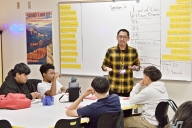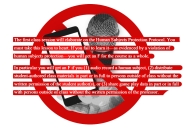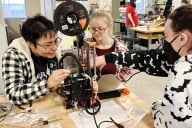You have /5 articles left.
Sign up for a free account or log in.

Tasha Vector/iStock/Getty Images Plus
Should I tell you what it has taken to get me in the door? Or should I tell you the excuses that have been made for why I am not worthy of crossing the threshold? Age. Sex. University politics. Perceived inability. In attempting to attain a faculty position in higher ed, I have only ever been ostracized for the shortcomings independently defined by each person, committee or university doling out the rejection. No space was ever given for mention of—and no questions were ever asked about—my successes or resilience. Some of us know better than others how broken the world is. Higher education is no different.
So, let’s address the elephant in academia. Where are all of the disabled and/or neurodivergent faculty members? I would hazard a guess that they are one of two places. The first place I would guess is in some field other than academia. They aren’t a faculty member because someone along the way decided to qualify their abilities and deemed them less than for something they are not required to ever divulge. Yet it was counted against them no less. The second place is in their offices and classrooms on campuses all over the United States, potentially hiding part of who they are or being treated differently because of their status.
I was 16 when I sustained my most life-changing mild traumatic brain injury, or concussion—one of the more than 15 I’ve sustained—during a soccer game. From that day forward, no matter whether I believed it or told anyone, I was disabled. My life was never the same. I still suffer from headaches, pain, memory loss, cognitive fatigue, attention deficit hyperactivity disorder and other cognitive deficits, which I manage daily. Doctors told me to give up on my dreams of college. I watched as almost everyone I knew either gave up on me or failed to believe my injury was real and that I was still suffering, because it couldn’t be seen.
Ten years, three neck surgeries, a little solo world travel, mountaintops, lots of failures and rejection, countless tears, a few wins, unrelenting effort, and three degrees later, here I am, standing at the front of the class, exhausted. The experience of interviewing as a neurodivergent, disabled, 20-something woman for a full-time faculty job has been what some would call traumatizing and has shown the true lack of accessibility. But I didn’t give up. I didn’t change who I was to fit any agenda. I worked tirelessly on tips and tricks to navigate interviews and hide my shame when I couldn’t remember the questions or when my speech slurred or cut off abruptly and I lost what I was talking about. After more than a year of attempts, I finally landed a full-time faculty position in fall 2021. But let me be clear: I barely made it here, and I was not the first choice for the position.
I love my job and believe in sharing my disability status with my students. I also believe in going against the grain by sharing my struggles and story with colleagues and the administration. I use it as a testament to who I am and to test who they are.
Now let’s get a few things straight about how you should treat your disabled and neurodivergent colleagues. Check your biases and how you speak to us, whether we have a visible or invisible disability. Stop saying, “I wouldn’t have known if you hadn’t told me” or “you hide it so well” or “that must be tough” or “wow, you’re so strong, I couldn’t imagine,” when someone divulges their disability or neurodivergence. These aren’t compliments. We are all here doing the same job, but many of us aren’t paying the same price. Some of us aren’t required to choose daily between our job and our health. Some of us don’t need to bring our service animals or use assistive equipment or technologies. Some of us can sit through one- to four-hour meetings without cognitive decline so severe that they can’t drive home after. Some of us don’t have physical disabilities. Some of us don’t have an invisible disability.
But most of all, some of us don’t have it in us to keep telling you we are fine when we aren’t. We are paying a price. We do have to choose between work and health. We do need assistive technology and service animals. We haven’t been able to drive home after work or meetings because the day has taken everything from us and it is no longer safe to do so. We do have physical and invisible disabilities. We adjust our schedules and tactics in private. We have our bag of tricks, which we just call our lives, that get us through each day.
Do not mistake my words as pleas for pity, for less work or to take it easy on us. No, we are faculty members and people just like everyone else, and we want to be treated as such. But a little consideration goes a long way, because there’s a part of who we are that isn’t quite like you. My disability, sex and age have been depicted as weaknesses and used against me more times than I can count. Why don’t we see them as strengths? In my experience, I have been able to connect and engage students on a deeper level by showing up on my best and worst days and simply telling them, “This is who I am. Now let’s get to work.”
So let’s address the elephant in the room again. Where are all the neurodivergent and disabled faculty members? They are exactly where you put them with your attitudes, opinions and lack of accessibility and consideration. Understand that we are capable, with incredible minds, and that although being disabled may be part of our identity, it does not define who we are. I can’t speak for anyone but myself when I say it is exhausting acting “normal” to make everyone else feel better when I am anything but normal. As I’ve been told by many a stranger, friend and colleague, I am not quite like other people. So, to quote Luvvie Ajayi, “In a world that wants us to whisper, I choose to yell.” Higher ed and the world want us to whisper, so here I am, yelling.








